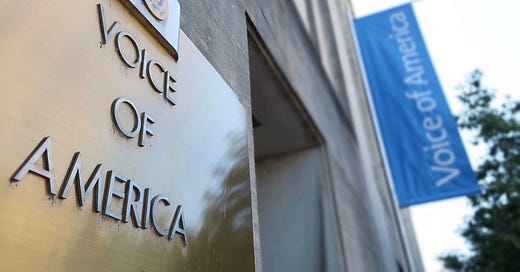By Stephen A. Seche
Imagine you are engaged in a heated debate, determined to convince those listening that they can trust you to speak the truth your adversary is distorting and concealing. Then suddenly, inexplicably, you go silent. All eyes and ears turn to your adversary, who now enjoys unimpeded access to an audience that just moments ago was up for grabs.
Welcome to a world in which the United States no longer delivers balanced, fair, and accurate news and information to listeners in the most unstable corners of the world, not least of which is the Middle East. Welcome to America's capitulation to Iran, Russia and China as they furiously disseminate messaging that portrays the United States as feckless, unreliable and disinterested in the security and stability of a conflict-prone region.
As Rob Satloff, the executive director of The Washington Institute for Near East Policy, posted on X: "Unilateral disarmament in the battle of ideas is an odd formula to make America great vis-a-vis our enemies & adversaries, who are overjoyed at mothballing of our international broadcasting.”
At issue is the Trump administration's decision to cease operations of U.S. government-funded news organizations that come under the purview of the U.S. Agency for Global Media (USAGM). In a March 16 email to the staff of the Middle East Broadcasting Networks (MBN), agency head Jeffrey Gedmin characterized the decision as "bewildering."
"Our journalism counters anti-American narratives," he wrote. "MBN is a thorn in the side of American adversaries. Hamas, Hezbollah, Houthis and other terror groups detest us. Anti-American tyrants ruling Iran loathe us."
MBN is a U.S. government-funded Arabic-language multimedia organization that, according to its website, reaches 33.5 million people in the Middle East and North Africa weekly. It was created to provide an alternative to "local, pan-Arab and foreign-owned Arabic media outlets in the region, which often are swayed by the economic, political and religious interests of their funders."
Apart from MBN, the executive order silences other notable government-funded international broadcasting operations, including the Voice of America, Radio Free Asia, Radio Free Europe/ Radio Liberty, and Radio Marti.
Somewhere along the way, this projection of American soft power to more than 425 million listeners in every part of the globe became, according to a press release that quoted freshly minted USAGM senior advisor Kari Lake described the agency as "a giant rot and burden to the American taxpayer." Not surprisingly, America's adversaries around the globe were gleeful. The former editor-in-chief of Beijing's state newspaper, The Global Times, wrote: "Voice of America has been paralyzed. And so has Radio Free Asia.... This is such great news."
In the Middle East, critics took to social media to compare the Trump Administration's decision to eliminate U.S. international broadcasting agencies with the abrupt American withdrawal from Afghanistan.
Not all the criticism comes from external sources, however. Alberto Fernandez, a retired U.S. ambassador and a former head of MBN, told me that while he was "somewhat ambivalent" about the president's decision, he felt that MBN never managed to establish its own identity and that "the dominant culture" at the agency was "not to offend anyone, be it regimes in the region or members of the U.S. Congress." The result, he claims, was a tepid and largely uninteresting broadcasting effort that never came close to eclipsing the region's most influential—and sometimes, in the eyes of the U.S. government—unhelpful Arabic-language stations: Al-Arabiya, owned by Saudi Arabia; Al-Jazeera, funded in part by Qatar; and Sky News Arabia, a joint venture between the UK Sky Group and the United Arab Emirates royal family.
When asked if he was concerned that defunding MBN would create an information vacuum our adversaries in the region would happily fill, Fernandez pointed to ongoing Arabic-language broadcasting supported by the British, German and French governments. Though true, it is also equally true that none of these governments claim to present an American perspective. Only the United States can speak for itself in a voice that is distinctively our own, one that reflects our national interests, aspirations, and long-established tradition of global leadership. That is, of course, until our own government silences that voice.
Stephen A. Seche was a career diplomat who served as U.S. ambassador to Yemen from 2007-2010. His debut novel, "The Silversmith's Secret," was published by Koehler Books on March 1.





We must face the fact that under the Trump regime portrayal of "the United States as feckless, unreliable and disinterested in the security and stability of a conflict-prone region." is a true statement. I could not imagine VOA being gutted and going offline 3 months ago. But here we are.
We'll probably wind up just sending them FOX News.....